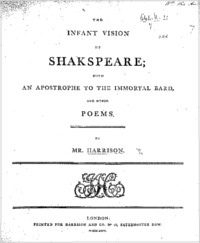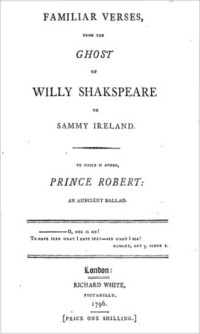With an Apostrophe to the Immortal Bard, and Other Poems
Anthony Harrison
London: Printed for Harrison and Co., No. 18, Paternoster Row, 1794
In this panegyric poem, Nature takes the child William Shakespeare to her breast to nurture him and endow him with the power to understand and eloquently express every human emotion. “Nature’s richest stores” are shown him, good and bad, and Shakespeare gently ennobles them in his plays. The same idea is expressed visually in George Romney’s copperplate engraving of “Shakespeare Attended by Nature and the Passions.”


